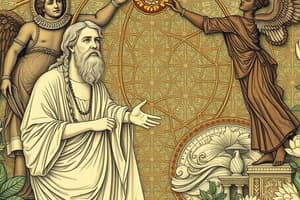Podcast
Questions and Answers
Which philosopher believed that an unexamined life is not worth living?
Which philosopher believed that an unexamined life is not worth living?
- Socrates (correct)
- Plato
- Rene Descartes
- St. Augustine
Which philosopher proposed the concept of tripartition of the soul?
Which philosopher proposed the concept of tripartition of the soul?
- Plato (correct)
- Socrates
- St. Augustine
- Rene Descartes
Which philosopher believed that humans and animals differ in their ability to think and freedom?
Which philosopher believed that humans and animals differ in their ability to think and freedom?
- Socrates
- Rene Descartes (correct)
- St. Augustine
- Plato
Which philosopher believed that the self consists of both the mind and the body?
Which philosopher believed that the self consists of both the mind and the body?
Which philosopher believed that the soul is capable of reaching immortality?
Which philosopher believed that the soul is capable of reaching immortality?
According to Socrates, what is the worst thing that can happen to anyone?
According to Socrates, what is the worst thing that can happen to anyone?
According to Plato, which component of the soul governs our conduct?
According to Plato, which component of the soul governs our conduct?
According to Plato, which component of the soul is associated with bodily desires and pleasure?
According to Plato, which component of the soul is associated with bodily desires and pleasure?
According to St. Augustine, what is the nature of man?
According to St. Augustine, what is the nature of man?
What are the two factors that differentiate humans from animals?
What are the two factors that differentiate humans from animals?
Flashcards
Unexamined Life
Unexamined Life
The belief that life without self-reflection and introspection is meaningless.
Who said 'The unexamined life is not worth living'?
Who said 'The unexamined life is not worth living'?
Socrates, a Greek philosopher who famously declared 'The unexamined life is not worth living.'
Tripartition of the Soul
Tripartition of the Soul
Plato's theory suggesting the soul is divided into three parts: a rational soul, a spirited soul, and an appetitive soul.
Rational Soul
Rational Soul
Signup and view all the flashcards
Spirited Soul
Spirited Soul
Signup and view all the flashcards
Appetitive Soul
Appetitive Soul
Signup and view all the flashcards
Mind-Body Dualism
Mind-Body Dualism
Signup and view all the flashcards
Thinking and Freedom
Thinking and Freedom
Signup and view all the flashcards
Immortality of the Soul
Immortality of the Soul
Signup and view all the flashcards
Bifurcated Nature of Man
Bifurcated Nature of Man
Signup and view all the flashcards
Study Notes
Philosphers and Their Concepts
- Socrates famously articulated that "an unexamined life is not worth living," emphasizing the importance of self-reflection and inquiry.
- Plato introduced the concept of the tripartition of the soul, dividing it into three parts: rational, spirited, and appetitive, each governing different aspects of human behavior.
- Immanuel Kant argued that humans distinguish themselves from animals through their capacity for rational thought and autonomy, enabling moral decision-making.
- René Descartes posited the duality of the self, asserting that humans consist of both the mind (reason) and the body (physical existence).
- Plato believed in the immortality of the soul, suggesting that it persists beyond physical death and is capable of achieving higher understanding.
Societal Implications According to Philosophers
- According to Socrates, the most detrimental outcome for an individual is to commit wrongdoing, as it corrupts the soul and leads to ignorance.
- In Plato's tripartite theory, the rational component of the soul is responsible for governing conduct, guiding individuals towards wisdom and virtuous actions.
- The appetitive component of Plato's soul scheme is linked to bodily desires and pleasures, driving individuals towards gratification and materialism.
Human Distinction and Nature
- St. Augustine described the nature of man as inherently flawed and in need of divine grace, highlighting a theological perspective on human existence.
- The two factors differentiating humans from animals are their capacity for abstract reasoning and their freedom to make moral choices, underscoring the unique human experience.
Studying That Suits You
Use AI to generate personalized quizzes and flashcards to suit your learning preferences.




